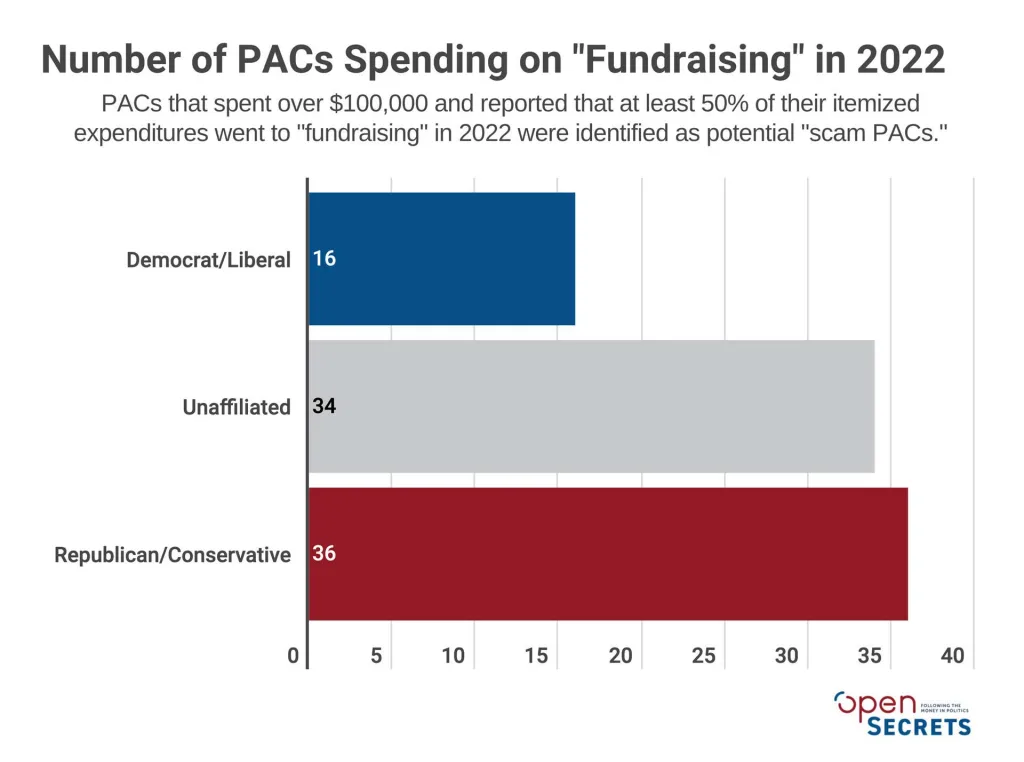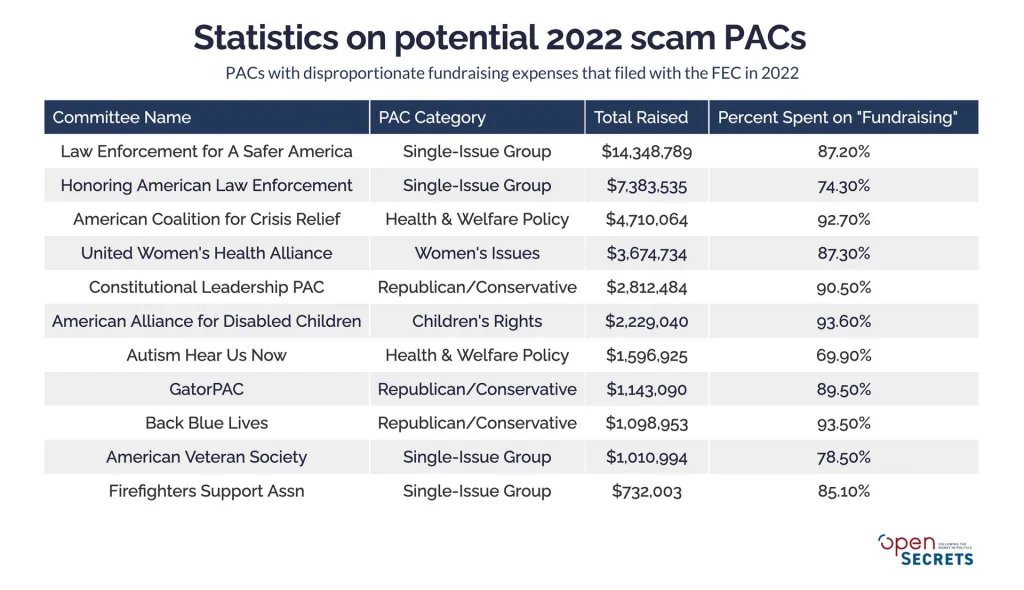Republished with permission from OpenSecrets, by Maia Cook
The media’s most popular campaign finance stories often focus on where political money comes from. Stories about “dark money” groups and straw donor schemes continue to emerge, calling attention to opaque contributors and the special interests behind them.
But the spotlight is often less focused on where that money goes—how it is managed and spent. Exploring political spending is important because it can unveil fraudulent fundraising schemes, such as so-called scam PACs.
Scam PACs are political groups that deceive voters—and often donors—by fundraising under the pretext that they are supporting a specific candidate or issue-based cause, like fighting cancer or supporting veterans. In turn, this money is used to engage in more fundraising, setting in motion a vicious cycle of political swindling, often hurting elderly constituents.
On Aug. 17th of 2023, the FBI and the U.S. Attorney for the Southern District of New York announced that a PAC treasurer—Robert Piaro (73)—and fundraiser—Richard Zeitlin (53)—were indicted for defrauding donors while soliciting money through a comprehensive telemarketing scheme. Persuaded by their faux advocacy, unsuspecting citizens gave millions of dollars to Piaro and Zeitlin’s scam PACs.
Without knowing the signs, it is easy to mistake a scam PAC for a legitimate political group or a charity.
One way to identify a scam PAC is when a PAC reports that the majority of their expenses went towards ambiguous “fundraising” or “consulting,” or a large chunk of spending is attributed to covering “compliance and other administrative costs.” This is often a sign that PACs are not engaging in any political advocacy, because little or no money is actually being directed to support certain electoral outcomes.
Another way to identify a scam PAC is when its address is the home address of one of its vendors. Scam PAC operators often have personal connections with the vendors they list, some of them being members of the scam PAC itself. Given the nature of these connections, much of the money ends up lining the pockets of scam PAC operators.
OpenSecrets identified 86 potential scam PACs in the 2022 federal election cycle. These 86 PACs were identified by two criteria: (i) they spent over $100k and (ii) at least 50% of their itemized expenditures were classified by OpenSecrets as fundraising expenses. Of these PACs, 42% were identified as Republican or conservative groups and 19% as Democratic or liberal.
In 2022, a scam PAC called the “Law Enforcement for a Safer America PAC” raised over $14 million, 87% of which went towards vague “fundraising” expenses. The PAC convinced voters to donate with heart-grabbing statements like, “[Law enforcement officers] kiss their children and spouses goodbye and go to work, not knowing if they will return home after their shift.”
The Law Enforcement for a Safer America PAC reported paying roughly $950,000 to a vendor called “Action Committee Marketing LLC,” all for the reported purpose of “fundraising, payment, technical & compliance services.”
The same scam PAC reported 124 payments totaling over $244,000 to a vendor called “LAV Services LLC.” LAV Services LLC was incorporated in 2022, along with three other limited-liability companies, from the same Delaware address. It is likely these companies were incorporated for the sole purpose of engaging with scam PACs—its incorporators knowingly benefiting from the fraud scheme.
In 2019, an Arizona resident named William Tierney was sentenced to two years in prison after pleading guilty to charges related to operating multiple scam PACs. Tierney was accused of “[w]illfully and knowingly, having devised and intending to devise a scheme and artifice to defraud, and for obtaining money and property by means of false and fraudulent pretenses, representations and promises.”
The indictment identified nine scam PACs operated by Tierney. These included the “Grassroots Awareness PAC,” (also known as the “Autism Awareness PAC”) “Americans for Law Enforcement PAC,” the “National Campaign PAC,” the “Voter Education PAC,” the “Action Coalition PAC,” the “Protect Our Future PAC,” the “Life and Liberty PAC,” the “Republican Majority Campaign PAC,” and the “RightMarch.com PAC.”
Another scam PAC called the “American Alliance for Disabled Children PAC” (also known as the “American Coalition for Autistic Children” and “Children’s Cancer Coalition”) raised over $2.2 million in the 2022 election cycle, 93.6% of which went to “fundraising.”
The American Alliance for Disabled Children PAC paid $816,000 to a vendor called “Public Support Services Inc.” for “fundraising, payment & compliance” services. The Law Enforcement for a Safer America PAC also reported nearly $1.6 million in payments to Public Support Services, all for “fundraising” services.
Public Support Services, a popular vendor among scam PACs, has very little information online. Public Support Services’ website has no more than six complete sentences. A third of the website is dedicated to a stock photo of businessmen sitting in an office meeting room, facing a screen displaying the word “analysis.”
The FEC has a reputation for failing to prosecute political fraud due to commissioner partisanship, frequent deadlocks and dismissals, and weakness as a civil enforcement regime. And yet, Saurav Ghosh, the federal campaign finance director at the Campaign Legal Center, told OpenSecrets, “Scam PACs are one of the areas where the FEC does a better job of enforcing the law.” The FEC refers cases to the Election Crimes Branch of the Department of Justice when criminal jurisdiction is necessary.
Scam PACs are one of the only fraudulent fundraising schemes that receive bipartisan scrutiny from federal candidates. “A fun aspect of scam PACs is that it’s one of those unusual areas where candidates themselves really get worked up about it,” Ghosh said. “[Candidates] don’t love campaign finance laws because it makes their life more difficult. But in this area, scam PACs are siphoning money away from them. It’s one area where candidates want to see the law enforced.”

OpenSecrets
OpenSecrets is the nation's premier research group tracking money in U.S. politics and its effect on elections and public policy. Our mission is to track the flow of money in American politics and provide the data and analysis to strengthen democracy. Our vision is for Americans to use this knowledge to create a more vibrant, representative and accountable democracy.


